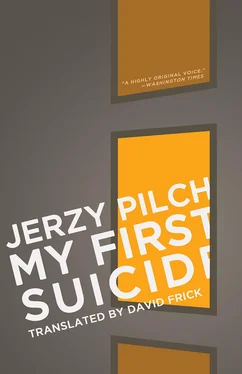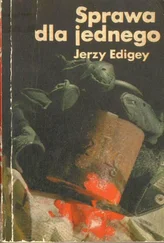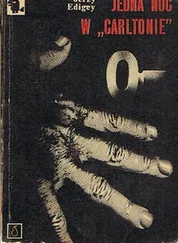“Join us, little girl,” said the one seated farthest away.
“I’m not a little girl,” I answered hundreds of times with a well-tested, maximally cold voice.
“But you look like a little girl. And if you look like a little girl, then you are a little girl, at least a bit. And if someone is a bit of a little girl, that means that he is in general a little girl,” the leader of the quartet of black Hanulas glanced at the three remaining ones and added significantly, “it is impossible to be slightly a little girl. It’s just that we had bad luck.”
And they began to laugh horribly, they roared with laughter, to this day I haven’t heard such laughter, nor have I seen such wallowing in laughter. All of a sudden, out of the blue, they stopped, and, as if they had practiced it a thousand times, with one melodious motion they slipped the undone scarfs from their heads.
“For now, we are undressing for you, a bit little boy, a bit little girl,” the whole time one of them did the talking, the others nodded their heads in agreement and looked at her with affectionate admiration and gratitude for expressing herself so beautifully in their names. “For now, we are undressing for you, but we don’t know what will come next. We prefer not to know. We prefer to pretend that we don’t know.”
The second and third Hanulas were blondes; the fourth was the most beautiful brunette in the world, and when she stood up and opened the little door to the stove and began, in the glow falling upon her, to add wood to the fire, she became so inhumanly beautiful that I got the shivers.
“Why are you so feverish, little girl?” the leader of the Hanulas came closer; she was the ugliest of them, and it wasn’t clear whether her plait, red in the light of the fire, was really red. “Why are you so feverish? You take care of yourself! Feverish little girls have to take special care of themselves. Don’t dance immoderately.”
The music came from all sides. Both the comb trio and the bottle quartet walked through all the halls and stairways. They walked in the direction of the courtyard and played like the possessed. The Potulnik brothers and Master Sztwiertnia were still having another shot, they were still puffing on their cigarettes, but they, too, began to look around for their instruments, for stools. Janek the tailor, on trumpet, the most talented of them all, was already climbing the podium, following him Władek the carpenter, on trombone, then Jurek the roofer, on clarinet, then Józef the bricklayer, on second trumpet, then Andrzej the stove-fitter, on accordion, then Master Sztwiertnia, on percussion, finally, old man Potulnik, on bass. The bottles and combs against the wall on the other side were already providing the melody, setting the tone; the Potulnik brothers and Master Sztwiertnia were gazing at them attentively and listening closely; with the greatest attention, they prepared to enter upon the appropriate chord. Everything I have learned about the seriousness of art I owe to the musicians of Wisła. The Potulnik brothers with their instruments, with sheet music and music stands, dressed in white shirts and black vests were like members of the Philharmonic (all, except for Janek the tailor, on trumpet, had taken off their sports jackets to play). And those who were playing on bottles and combs were street musicians without elegant tailcoats and instruments, because, finally, what sort of instrument is that: a piece of parchment applied to a comb or to a bottle with the bottom broken off. But the music was one, the perfect pitch was the same, and the same the respect for the craft. And a faithful memory — for the Potulnik brothers and Master Sztwiertnia had perfect memories of weddings from times gone by, festivities at which they had accompanied on bottles and combs the orchestra of old Nogowczyk, all of which has long turned to dust; and those members of the Philharmonic leaned down over their droning just the same way from the heights of the podium and played with them just the same. That’s right: they played with them. The music came from all sides. Master Sztwiertnia, the brothers Potulnik, all the Wisła musicians with the talents of Mozart: we can hear you. We hear your music. The grass rises on Gróniczek Cemetery Hill, and the heavens part over Czantoria.
About a month ago, I bought a CD: Mozart, Prague, Les dernières vendanges . A group called “Le Trio di Bassetto et ses invités” plays little pieces of Mozart and little pieces of little known or entirely unknown Czech composers of his era. My God! It isn’t any “Trio di Bassetto,” it’s the Potulnik brothers and Master Sztwiertnia who are playing! The spirits of the brothers Potulnik have been incarnated in that “Trio di Bassetto!” Even more! One of the “invités”—the percussionist — that isn’t the spirit of Master Sztwiertnia! That is Master Sztwiertnia, flesh and blood! I recognize him without the shadow of a doubt! Only he had that incomprehensibly rhythmic and at the same time thoroughly free, delicate, and exceptionally strong beat on the drum.
There are thirty-one seconds of music on that CD composed by an anonymous contemporary of Mozart’s, and those thirty-one seconds are my life, my childhood, my literature, and my music. My eternity lasts thirty-one seconds. Play that over my grave, but four times. Let me be granted a fourfold eternity. Let me be granted a whole one hundred and twenty-four seconds. I’ll have clay in my ears, but I will hear. That is the music that the Potulnik brothers and Master Sztwiertnia played at young Trzmielowski’s wedding. This is music that was recorded then and there. God already had the suitable equipment in the fifties of the twentieth century. That is the music to the accompaniment of which funerals walked and wedding parties drove through the streets of Wisła; this is the music to which floods, snows, and heat waves descended upon us. Our sky brightened and darkened to this music. Andrzej Wantuła would visit us to this music, to this music we would sit down to the Christmas Eve table, this music was playing when Grandpa would light the fire in the hearth at dawn, and when anyone entered our gigantic kitchen. This music was there when, one fine day, an angel with folded wings stood in the middle of our courtyard that was paved with river stones.
The brothers Potulnik and Master Sztwiertnia played their hearts out, time after time and with variations, langsam und trübe . The four black Hanulas suddenly began to crowd before the mirror. I again looked into all the rooms, but they were all empty. There weren’t even the miners from the American gold mine dressed up in uniforms. “Aria! Aria!” I called as if in my sleep, “Aria, where are you?” She was the first and the greatest love of my life. God sent me many fantastic women. I have been with completely dazzling women; I loved them, and they loved me, but however often I think of Aria in a gray skirt sewn from an old coat turned inside out, whenever I think of that little girl, older than me by three or maybe four years, I am always certain that she was meant for me. She would have kept watch over me, at her side I would have had a good life, we would have set up house together in an old house, eternally covered with snow. Every Sunday we would have gone to the main church service, in the evenings we would have played dominoes and drunk tea with chokeberry syrup. Sometimes, when she would have gone on some larger shopping errand to Cieszyn, and if the couple hours without her were unbearable, I would have taken a thick notebook with green covers and attempted to continue the story about chess or about my first love, which I had begun long ago. But always, before I could compose even one sentence, I would hear her opening the gate and walking across the yard, and I would leave my writing and go out to meet her and relieve her of the heaviest bag with the books, wine, and bread, and we would sit in the kitchen, and she would tell me the news. This would have been a thousand times better than the fulfillment that is granted to me now: when, after constructing the hundredth, or even the thousandth sentence, no one opens the gate, no one goes through the yard, and no one tells me the news. I have what I wanted: I can compose sentences to the bitter end.
Читать дальше












